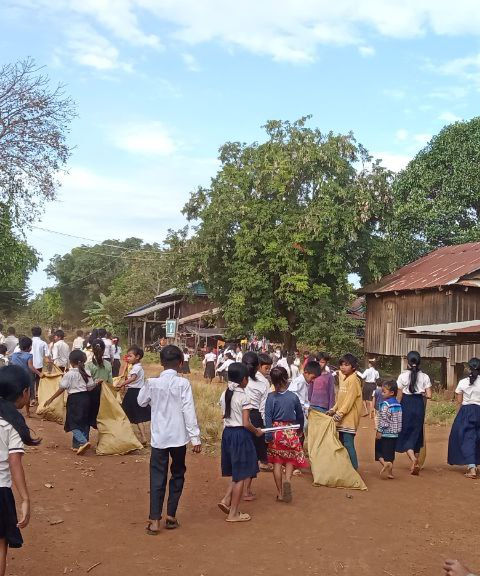
Preparing for National Eco-Schools Award
Case study :
Eco School
Partners:
Wildlife Conservation Society, Cambodia
Year:
2022-Present
Location:
Keo Seima Wildlife Sanctuary (KSWS)
Limited Knowledge & Limited Educational Material
Teachers lack basic understanding of the importance of biodiversity which is compounded by the little supporting material/visual aid for teaching and learning. There is limited support to integrate environmental study into the teaching program, and the absence of any pull from students & parents to learn or care about nature doesn’t motivate the teacher to go the extra mile.
Lack of Infrastructure & Resources
Schools in this region suffer from basic issues like not enough teachers, low student attendance and cultural conflicts with indigenous people who traditionally had no schools. Under these circumstances, it becomes difficult to pay attention to nature & environmental conservation at school.

KSWS is a biologically and culturally rich protected area on a deforestation frontier which is home to the Bunong minority group, and an additional 25000 nonindigenous people who live along its border. Demographically the villages have a larger proportion of young people with rapid population increase which puts considerable strain on natural resources. The objective of this project was to get the schools in this region ready for the National Eco-schools Award,
4 schools that met the national and international selection guidelines were selected from a total of 24 schools.
MoUs were signed between the MoE, MoEYS, WCS and the schools once all stakeholders agreed on the project plan.
In consultation with school principals and teachers Young Eco evaluated the gaps in knowledge and resource.
6 topics under the theme of Forestry and Biodiversity - Wild Species and Waste Management were identified to be addressed through 12 theoretical and practical sessions.
Educational material comprised creating new material as well as mobilising and adapting existing resources
All teachers involved in the program were supported with a train-the-trainer program to deliver the sessions smoothly to the students and received a seedfund of USD 1000 to cover the costs of these sessions.
Each school also received waste management infrastructure support in terms of incinerator, rubbish bin, and composting system.

Since 2022
+1000 Students Reached
+10 Community Clean up Activation
9 School Gardens Innitiated
8 Waste Incinerators Provided
9 Compost sites Provided or Improved
1 Student Competition Organized
27 Teachers Supported
3 Trainings Conducted for Teachers
1 Design Thinking Camp Hosted for Students and Teachers
9 Sets of Materials Produced
1 Study Visit Hosted to Watbo Primary School and ACCB in n Siem Reap Province
23 instructional videos on eco-school criteria were distributed to teachers via Telegram.

Learn more:
4 schools that met the national and international selection guidelines were selected from a total of 24 schools.
MoUs were signed between the MoE, MoEYS, WCS and the schools once all stakeholders agreed on the project plan.
In consultation with school principals and teachers Young Eco evaluated the gaps in knowledge and resource.
6 topics under the theme of Forestry and Biodiversity - Wild Species and Waste Management were identified to be addressed through 12 theoretical and practical sessions.
Educational material comprised creating new material as well as mobilising and adapting existing resources
All teachers involved in the program were supported with a train-the-trainer program to deliver the sessions smoothly to the students and received a seedfund of USD 1000 to cover the costs of these sessions.
Each school also received waste management infrastructure support in terms of incinerator, rubbish bin, and composting system.

Provide the Ecosystem to become a Eco-School
Young Eco created a comprehensive program to work together with the Ministry of Environment (MoE), Ministry of Education, Youth & Sports (MoEYS) and schools to integrate school curriculums, create educational material and support teachers to design an effective infrastructure to enable schools to become eco-schools.
Young Eco has been supporting 9 schools ( 7 Primary Schools and 2 Secondary schools in KeoSeima Wildlife Sanctuary (KSWS) since 2022.























